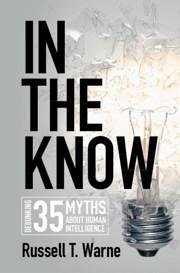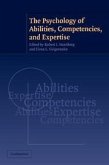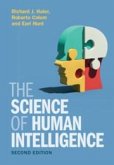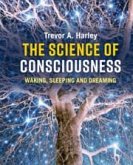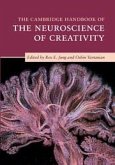Russell T Warne
In the Know
Russell T Warne
In the Know
- Gebundenes Buch
- Merkliste
- Auf die Merkliste
- Bewerten Bewerten
- Teilen
- Produkt teilen
- Produkterinnerung
- Produkterinnerung
Out with the myths and in with the truth. Learn what intelligence really means from a qualified expert.
Andere Kunden interessierten sich auch für
![The Value of Intellectual Styles The Value of Intellectual Styles]() Li-Fang ZhangThe Value of Intellectual Styles147,99 €
Li-Fang ZhangThe Value of Intellectual Styles147,99 €![The Psychology of Abilities, Competencies, and Expertise The Psychology of Abilities, Competencies, and Expertise]() Robert J. Sternberg / Elena Grigorenko (eds.)The Psychology of Abilities, Competencies, and Expertise75,99 €
Robert J. Sternberg / Elena Grigorenko (eds.)The Psychology of Abilities, Competencies, and Expertise75,99 €![The Science of Human Intelligence The Science of Human Intelligence]() Richard J HaierThe Science of Human Intelligence157,99 €
Richard J HaierThe Science of Human Intelligence157,99 €![Technology and Measurement around the Globe Technology and Measurement around the Globe]() Technology and Measurement around the Globe111,99 €
Technology and Measurement around the Globe111,99 €![The Science of Consciousness The Science of Consciousness]() Trevor A HarleyThe Science of Consciousness224,99 €
Trevor A HarleyThe Science of Consciousness224,99 €![The Cambridge Handbook of the Neuroscience of Creativity The Cambridge Handbook of the Neuroscience of Creativity]() The Cambridge Handbook of the Neuroscience of Creativity252,99 €
The Cambridge Handbook of the Neuroscience of Creativity252,99 €![The Creativity Advantage The Creativity Advantage]() James C KaufmanThe Creativity Advantage95,99 €
James C KaufmanThe Creativity Advantage95,99 €-
-
-
Out with the myths and in with the truth. Learn what intelligence really means from a qualified expert.
Hinweis: Dieser Artikel kann nur an eine deutsche Lieferadresse ausgeliefert werden.
Hinweis: Dieser Artikel kann nur an eine deutsche Lieferadresse ausgeliefert werden.
Produktdetails
- Produktdetails
- Verlag: Cambridge University Press
- Seitenzahl: 434
- Erscheinungstermin: 29. Oktober 2020
- Englisch
- Abmessung: 232mm x 160mm x 24mm
- Gewicht: 816g
- ISBN-13: 9781108493345
- ISBN-10: 1108493343
- Artikelnr.: 59757377
- Herstellerkennzeichnung
- Libri GmbH
- Europaallee 1
- 36244 Bad Hersfeld
- gpsr@libri.de
- Verlag: Cambridge University Press
- Seitenzahl: 434
- Erscheinungstermin: 29. Oktober 2020
- Englisch
- Abmessung: 232mm x 160mm x 24mm
- Gewicht: 816g
- ISBN-13: 9781108493345
- ISBN-10: 1108493343
- Artikelnr.: 59757377
- Herstellerkennzeichnung
- Libri GmbH
- Europaallee 1
- 36244 Bad Hersfeld
- gpsr@libri.de
Russell T. Warne is Associate Professor of Psychology at Utah Valley University, and an educational psychologist. He is the author of the successful textbook for undergraduates Statistics for the Social Sciences (Cambridge, 2018).
Introduction
Section 1. The Nature of Intelligence: 1. Intelligence is whatever collection of tasks a psychologist puts on a test
2. Intelligence is too complex to summarize with one number
3. IQ does not correspond to brain anatomy or functioning
4. Intelligence is a western concept that does not apply to non-western cultures
5. There are multiple intelligences in the human mind
6. Practical intelligence is a real ability, separate from general intelligence
Section 2. Measuring Intelligence: 7. Measuring intelligence is difficult
8. Content of intelligence tests is trivial and cannot measure intelligence
9. Intelligence tests are imperfect and cannot be used or trusted
10. Intelligence tests are biased against diverse populations
Section 3. Influences on Intelligence: 11. IQ only reflects a person's socioeconomic status
12. High heritability for intelligence means that raising IQ is impossible
13. Genes are not important for determining intelligence
14. Environmentally driven changes in IQ mean that intelligence is malleable
15. Social interventions can drastically raise IQ
16. Brain-training programs can raise IQ
17. Improvability of IQ means intelligence can be equalized
Section 4. Intelligence and Education: 18. Every child is gifted
19. Effective schools can make every child academically proficient
20. Non-cognitive variables have powerful effects on academic achievement
21. Admissions tests are a barrier to college for underrepresented students
Section 5. Life Consequences of Intelligence: 22. IQ scores only measure how good someone is at taking tests
23. Intelligence is not important in the workplace
24. Intelligence tests are designed to create or perpetuate a false meritocracy
25. Very high intelligence is not more beneficial than moderately high intelligence
26. Emotional intelligence is a real ability that is helpful in life
Section 6. Demographic Group Differences: 27 Males and females have the same distribution of IQ scores
28. Racial/ethnic group IQ differences are completely environmental in origin
29. Unique influences operate on one group's intelligence test scores
30. Stereotype threat explains score gaps among demographic groups
Section 7. Societal and Ethical Issues: 31. Controversial or unpopular ideas should be held to a higher standard of evidence
32. Past controversies taint modern research on intelligence
33. Intelligence research leads to negative social policies
34. Intelligence research undermines the fight against inequality
35. Everyone is about as smart as I am
Conclusion.
Section 1. The Nature of Intelligence: 1. Intelligence is whatever collection of tasks a psychologist puts on a test
2. Intelligence is too complex to summarize with one number
3. IQ does not correspond to brain anatomy or functioning
4. Intelligence is a western concept that does not apply to non-western cultures
5. There are multiple intelligences in the human mind
6. Practical intelligence is a real ability, separate from general intelligence
Section 2. Measuring Intelligence: 7. Measuring intelligence is difficult
8. Content of intelligence tests is trivial and cannot measure intelligence
9. Intelligence tests are imperfect and cannot be used or trusted
10. Intelligence tests are biased against diverse populations
Section 3. Influences on Intelligence: 11. IQ only reflects a person's socioeconomic status
12. High heritability for intelligence means that raising IQ is impossible
13. Genes are not important for determining intelligence
14. Environmentally driven changes in IQ mean that intelligence is malleable
15. Social interventions can drastically raise IQ
16. Brain-training programs can raise IQ
17. Improvability of IQ means intelligence can be equalized
Section 4. Intelligence and Education: 18. Every child is gifted
19. Effective schools can make every child academically proficient
20. Non-cognitive variables have powerful effects on academic achievement
21. Admissions tests are a barrier to college for underrepresented students
Section 5. Life Consequences of Intelligence: 22. IQ scores only measure how good someone is at taking tests
23. Intelligence is not important in the workplace
24. Intelligence tests are designed to create or perpetuate a false meritocracy
25. Very high intelligence is not more beneficial than moderately high intelligence
26. Emotional intelligence is a real ability that is helpful in life
Section 6. Demographic Group Differences: 27 Males and females have the same distribution of IQ scores
28. Racial/ethnic group IQ differences are completely environmental in origin
29. Unique influences operate on one group's intelligence test scores
30. Stereotype threat explains score gaps among demographic groups
Section 7. Societal and Ethical Issues: 31. Controversial or unpopular ideas should be held to a higher standard of evidence
32. Past controversies taint modern research on intelligence
33. Intelligence research leads to negative social policies
34. Intelligence research undermines the fight against inequality
35. Everyone is about as smart as I am
Conclusion.
Introduction
Section 1. The Nature of Intelligence: 1. Intelligence is whatever collection of tasks a psychologist puts on a test
2. Intelligence is too complex to summarize with one number
3. IQ does not correspond to brain anatomy or functioning
4. Intelligence is a western concept that does not apply to non-western cultures
5. There are multiple intelligences in the human mind
6. Practical intelligence is a real ability, separate from general intelligence
Section 2. Measuring Intelligence: 7. Measuring intelligence is difficult
8. Content of intelligence tests is trivial and cannot measure intelligence
9. Intelligence tests are imperfect and cannot be used or trusted
10. Intelligence tests are biased against diverse populations
Section 3. Influences on Intelligence: 11. IQ only reflects a person's socioeconomic status
12. High heritability for intelligence means that raising IQ is impossible
13. Genes are not important for determining intelligence
14. Environmentally driven changes in IQ mean that intelligence is malleable
15. Social interventions can drastically raise IQ
16. Brain-training programs can raise IQ
17. Improvability of IQ means intelligence can be equalized
Section 4. Intelligence and Education: 18. Every child is gifted
19. Effective schools can make every child academically proficient
20. Non-cognitive variables have powerful effects on academic achievement
21. Admissions tests are a barrier to college for underrepresented students
Section 5. Life Consequences of Intelligence: 22. IQ scores only measure how good someone is at taking tests
23. Intelligence is not important in the workplace
24. Intelligence tests are designed to create or perpetuate a false meritocracy
25. Very high intelligence is not more beneficial than moderately high intelligence
26. Emotional intelligence is a real ability that is helpful in life
Section 6. Demographic Group Differences: 27 Males and females have the same distribution of IQ scores
28. Racial/ethnic group IQ differences are completely environmental in origin
29. Unique influences operate on one group's intelligence test scores
30. Stereotype threat explains score gaps among demographic groups
Section 7. Societal and Ethical Issues: 31. Controversial or unpopular ideas should be held to a higher standard of evidence
32. Past controversies taint modern research on intelligence
33. Intelligence research leads to negative social policies
34. Intelligence research undermines the fight against inequality
35. Everyone is about as smart as I am
Conclusion.
Section 1. The Nature of Intelligence: 1. Intelligence is whatever collection of tasks a psychologist puts on a test
2. Intelligence is too complex to summarize with one number
3. IQ does not correspond to brain anatomy or functioning
4. Intelligence is a western concept that does not apply to non-western cultures
5. There are multiple intelligences in the human mind
6. Practical intelligence is a real ability, separate from general intelligence
Section 2. Measuring Intelligence: 7. Measuring intelligence is difficult
8. Content of intelligence tests is trivial and cannot measure intelligence
9. Intelligence tests are imperfect and cannot be used or trusted
10. Intelligence tests are biased against diverse populations
Section 3. Influences on Intelligence: 11. IQ only reflects a person's socioeconomic status
12. High heritability for intelligence means that raising IQ is impossible
13. Genes are not important for determining intelligence
14. Environmentally driven changes in IQ mean that intelligence is malleable
15. Social interventions can drastically raise IQ
16. Brain-training programs can raise IQ
17. Improvability of IQ means intelligence can be equalized
Section 4. Intelligence and Education: 18. Every child is gifted
19. Effective schools can make every child academically proficient
20. Non-cognitive variables have powerful effects on academic achievement
21. Admissions tests are a barrier to college for underrepresented students
Section 5. Life Consequences of Intelligence: 22. IQ scores only measure how good someone is at taking tests
23. Intelligence is not important in the workplace
24. Intelligence tests are designed to create or perpetuate a false meritocracy
25. Very high intelligence is not more beneficial than moderately high intelligence
26. Emotional intelligence is a real ability that is helpful in life
Section 6. Demographic Group Differences: 27 Males and females have the same distribution of IQ scores
28. Racial/ethnic group IQ differences are completely environmental in origin
29. Unique influences operate on one group's intelligence test scores
30. Stereotype threat explains score gaps among demographic groups
Section 7. Societal and Ethical Issues: 31. Controversial or unpopular ideas should be held to a higher standard of evidence
32. Past controversies taint modern research on intelligence
33. Intelligence research leads to negative social policies
34. Intelligence research undermines the fight against inequality
35. Everyone is about as smart as I am
Conclusion.

